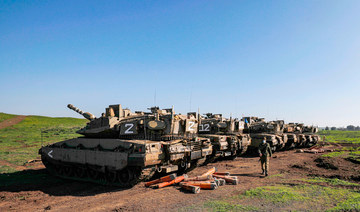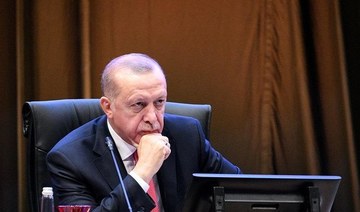ANKARA: After years of minimal and sour relations between Turkey and Israel, Ankara is set to extend an olive branch to Tel Aviv and improve bilateral diplomatic ties.
“Our relations with Israel in the intelligence field have not ceased anyway; they are still continuing,” Turkish President Recep Tayyip Erdogan said on Dec. 25, following reports that Azerbaijani President Ilham Aliyev has offered his mediation.
Recently, Erdogan’s Adviser Mesut Hakki Casin said that Turkey could again buy weapons from Israel to strengthen cooperation between Turkish and Israeli defense industries.
Intelligence talks resumed between the two sides, and while commercial ties still continue, both countries expelled their ambassadors in May 2018 over the killing of dozens of Palestinians by Israeli forces along the Gaza border and the US decision to relocate its embassy to Jerusalem.
Erdogan said Turkey had some issues with “people at the top level” in Israel, adding that Palestine still constitutes Turkey’s red line and that it was impossible for Ankara to accept Israel’s “merciless” policies for the Palestinian territories.
The Mavi Marmara incident, which involved the raid of a Gaza-bound flotilla carrying humanitarian aid for Palestinians in 2010, resulted in a serious crisis for Turkish-Israeli relations that took almost a decade to recover despite US mediation.
As a serious stumbling block to the normalization of relations, Israel accuses Turkey of granting passports to members of Hamas in Istanbul. For its part, Ankara keeps criticizing the recent rapprochement between Israel and Gulf countries.
Experts do not anticipate a real improvement of bilateral ties before the outcome of Israeli elections in March 2021.
Dr. Selin Nasi, a researcher on Turkey-Israel relations from Bogazici University in Istanbul, thinks the two countries might exchange ambassadors in the future, perhaps after the Israeli elections in March.
“However, one has to distinguish between the prospective restoration of diplomatic relations and a genuine lasting normalization of bilateral ties. For the latter, rebuilding mutual trust becomes essential. This requires time as much as a recalibration of policies,” she told Arab News.
According to Aydin Sezer, an Ankara-based Middle East expert, Turkey intends to reduce the number of its “foes” on the international scene.
“The election of Joe Biden to the US presidency has been an opportunity to repair ties. With this Israeli move, Turkey wants to reach out to the Jewish lobby in the US to get their unconditional support,” he told Arab News.
“A normalization in Turkish-Israeli relations would also send a message to Tehran to watch its step in the region,” Sezer added.
Ufuk Ulutas, the potential ambassador, is not a career diplomat. He has worked as the director of the pro-government think-tank SETA as an expert on Iran, studied at the Hebrew University in Jerusalem and is known as a pro-Palestinian figure.
Speculations in Israel and Turkey are running high with regard to the serious problems that Ulutas might face in receiving diplomatic approval from the Israeli government because of his anti-Israel views, which he has voiced in the past in different TV interviews and written reports.
Turkey’s choice in Ulutas has been interpreted by the Israeli press as a “continuation of Ankara’s provocation policy.”
Appointing a professional diplomat to this post has been always the tradition in bilateral relations until the Mavi Marmara crisis and was seen as a gesture to show the importance that is accorded to the relations.
Soner Cagaptay of the Washington Institute for Near East Policy thinks Erdogan’s remarks on Friday signal that Turkey wants to end its complete isolation in the Middle East and Eastern Mediterranean, as it has almost no friends or allies in the region.
“There is also an Eastern Mediterranean angle in this willingness for rapprochement,” he told Arab News.
The energy and defense cooperation between Egypt, Greece and Israel might create a challenging atmosphere for Turkish moves in the region.
“Turkey feels the need to break Israel from this alliance that excludes Turkey,” Cagaptay said.
“There is a perception in Ankara that Erdogan’s charm offensive toward Biden is to provide a sweetener to the US as Israel is America’s closest ally in the Middle East. This driver seems also to be behind Erdogan’s desire to normalization,” he added.
Nasi thinks that the emergence of the EastMed Gas Forum in the Mediterranean as well as Israel’s normalization of relations with Gulf countries proves the limits of Ankara’s identity-based foreign policy.
“By normalizing relations with Israel, Ankara is primarily hoping to divide the power bloc in the Mediterranean, at best weaken what she perceives to be a hostile axis to constrain her. Rapprochement with Israel might also help Turkey to win Washington’s ear again, neutralizing the opposition,” she said.
However, Cagaptay is not sure that Israel will completely and immediately reciprocate.
“Nowadays, Israel is normalized in regional relations, in contrast to ten years ago. It has many friends. It will not immediately embrace Erdogan. They will remain lukewarm, and they will not be jumping to the conclusion that they will have full-fledged ties with Turkey anytime soon,” he said. “Turkey’s ties with Hamas will also be an obstacle before the normalization.”
Nasi agrees, also skeptical about whether Turkey is willing at this stage to compromise on the issue of providing support to Hamas and the Muslim Brotherhood, which constitutes one of the main obstacles hindering reconciliation from Israel’s view.
“A long-lasting normalization between Turkey and Israel requires the redefinition of bilateral ties on the basis of common geopolitical interests, downplaying ideological preferences,” she said.
For Nasi, there is still no clear indicator that Ankara is changing course.
“Turkish rulers seem to be after an easy victory, set for maximum gains at minimum costs. It is hard to reconcile normalization efforts with reports that suggest Turkey is allegedly granting passports to Hamas members or releasing of videos with a message of liberating Jerusalem,” she said.
“At the end of the day, messages addressed to a domestic audience are always being monitored by international public opinion.”

























